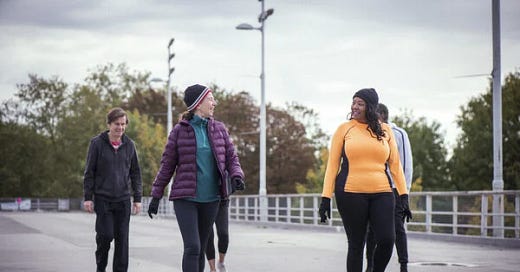What is more beneficial for health as we age: losing weight or being fit?
This is a question that those of us in our later years need to consider as much as someone in their 30s or 40s.
Many people would take the first option: lose weight. After all, there is plenty of data informing us of the dangers of obesity. Fat forms around the organs in our torsos and can lead to cancers, diabetes, strokes or heart attacks.
It’s because of these dangers due to fat formation that many insurance companies won’t touch an obese individual with a ten foot pole.
So, what is “obese”? For that answer, physicians, physiologists and fitness experts rely on the BMI or Body Mass Index. (Try this calculator)
For years, BMI has been the benchmark against which we measured our bodies. It has been the ‘seer’ or the ‘prophet of doom’; if you had a certain weight to height ratio, you were either good to go or going for good.
The problem is that BMI is practically useless on its own. I was checking my own BMI once and was informed that I was “overweight”. For the fun of it, I plugged in some new numbers that belonged to a top player in the National Hockey League. The BMI Index deemed this athlete “overweight” as well.
BMI doesn’t account for the muscle to fat ratio in one’s body nor does it account for one’s age or the changes to that ratio that naturally occur with aging.
And at the end of the day, it’s one measurement; if you were on trial for a crime you hadn’t committed, you wouldn’t likely want a judge or jury to convict you on a single piece of evidence.
So, back to the opening question. If you’re overweight, you should obviously lose that weight and thereby regain a level of fitness, BMI or no BMI. Correct?
Nope.
Of all the studies on health, fitness, and longevity, there has finally been one that takes in literally hundreds of thousands of individuals, both men and women, middle aged and older, and from nearly 40 countries around the world.
It is the most comprehensive examination ever undertaken to date.
And the one surprising conclusion was this: you can be obese according to a BMI measurement but if you are fit at the same time, then your chances of living a long, healthy life are far better than someone who is unfit but with a “normal” BMI.
Fit trumps fat (except if you ARE Trump, then you’re just fat and unfit for office).
There’s even more good news from the study; in order to go from ‘unfit’ to ‘fit’, you do not have to bust your gut in the gym pushing weights or running for 40 minutes on a treadmill.
The study indicates that brisk walks several times a week will be sufficient to move you into a higher state of physical fitness.
Many of us who are older can easily achieve this manageable goal.
Now, there’s another element to the story of fat and fat burning. It involves target heart rates, maximum heart rates and fat-burning “zones”.
Most gyms have posted fat-burning charts but, just like the BMI, these fat-burning charts are totally arbitrary and rarely accurate.
The usual manual calculation to determine your maximum heart rate is 220 minus your age. But this isn’t accurate, either.
Check the Washington Post story in the link above for better options.
Having an inaccurate target heart rate number means you could be overdoing exercise trying to burn fat and end up burning carbs instead which are necessary to create muscle.
Once you have a decent idea of YOUR maximum heart rate (again, see the link above), then figure on working to reach around 60% of that number.
While this next method isn’t scientific, either, it, too is a very good yardstick: when walking, choose a speed that you feel you could maintain for 45 minutes and you’ll likely settle into a pace that naturally falls into your ideal fat burning zone.
Whatever method you choose – the scientific, fitness lab-proven method or your own seat-of-the-pants method – the bottom line is that getting to a point of fitness is not difficult, arduous or time consuming.
Of course, a shot of Ozempic each month is faster (and WAY more expensive). But it’s not about the BMI, anymore! It’s about being fit. And Ozempic, et al, won’t get you there at all.






Agreed! Plus, regular exercise improves mental health (for example: https://www.mayoclinic.org/diseases-conditions/depression/in-depth/depression-and-exercise/art-20046495).
From my personal experience I know that on times when I have to take a break from daily running or walking, I feel the impact on my own stress and unease levels, and how great it feels after going out. That experience also motivates me to go out even if I don’t feel like it at the moment- because I know and want the reward of the exercise. The key is persistence, building it into the daily routine. And if on occasion I can only go for 30 min and not 60, well - 30 is much better than zero.